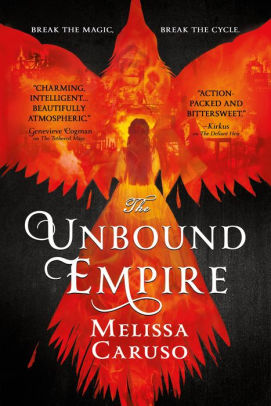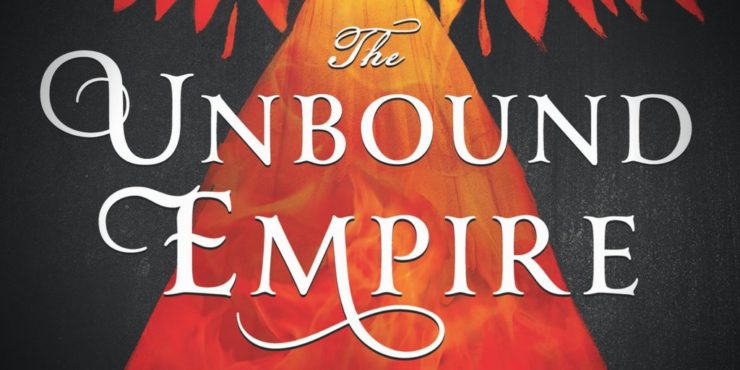It’s no secret that I thoroughly enjoyed the first two novels in Melissa Caruso’s Swords and Fire trilogy, The Tethered Mage and The Defiant Heir. When I tell you The Unbound Empire is even better than Caruso’s earlier offerings, then, you should be aware I may be biased by my existing delight. But The Unbound Empire builds on everything that came before it, mounting to a stunning conclusion—one that more than pays off three volumes of character development and political shenanigans. I don’t often use the term tour de force. Most of the time, it makes me suspicious when I come across it as a description. But when it comes to The Unbound Empire?
As far as I’m concerned, it fits.
In The Defiant Heir, Amalia learned how terrible an enemy she and her city had in the Witch Lord Ruven, and how ruthless she could be in order to thwart his designs. (She also deepened her friendship with Zaira, and began to understand how complicated her romantic life would be, as a significant political power who takes her responsibilities seriously.) In part thanks to an alliance with the less-terrifying Witch Lord Kathe—who’s been courting Amalia as part of the political manoeuvring, a courtship that may or may not also be sincerely meant—Ruven has been delayed in his plans of conquest, though now he may be even more determined to co-opt Amalia to his own ends.
Spoilers ahead.
In the brief breathing space, Amalia’s turned her attention to changing the law in Raverra that forces the magically-talented into military service in the Falcons. Still on the alert for Ruven’s next gambit and for treachery among her fellow politicians—her mother’s colleagues—she’s startled and disturbed when she encounters Ruven in the city. She and her friend Marcello escape, seemingly unscathed, and no one can identify what Ruven has actually done. He must have done something, for why else would he be there?
On the day of Amalia’s first major political triumph, disaster strikes. An attack on the Falcons is combined with an attack on the city’s political leadership. The doge is dead—by Marcello’s hand. Ruven’s changed him somehow. But personal considerations and griefs have to come second to Amalia’s wider responsibilities. Ruven is on the march. With many of Raverra’s usual military defences in disarray, Amalia and Zaira are dispatched to hold the line against Ruven’s conscripts and his magic, as Amalia struggles with her freshly increased responsibilities. As a fire warlock, Zaira is one of the most powerful and potentially destructive people in the world, but she’s not exactly comfortable with being valued mainly for her capabilities as a weapon. The war takes both of them back to Vaskandar in Kathe’s company, for a last-ditch desperate attempt at preventing Ruven’s conquest by striking at the heart of his power.
Buy the Book


The Unbound Empire
Caruso writes a rich, complex world, one both atmospheric and convincing. Her action scenes are tense and gripping, full of emotion—and The Unbound Empire is perfectly paced to keep the tension building all the way to its enormously satisfying conclusion. But for me, what gives Caruso’s work its depth and richness—what makes it shine so vividly—are the characters and their relationships. Though we see all of the characters and their relationships with each other through Amalia’s eyes, they each feel real and vibrant, with lives and choices of their own, and arcs of growth and change.
Amalia’s relationship with her mother stands out, and has continually stood out over the course of the trilogy, as an example of a mother-daughter relationship that’s not always smooth but is healthy and full of mutual respect. La Contessa believes in Amalia’s intelligence and supports her to become not La Contessa’s mirror image, but to develop in her own ways. And the relationship between Amalia and Zaira is a joy. Zaira’s prickly, sarcastic, and inclined to challenge Amalia on her privilege and preconceptions, and over the course of the trilogy their friendship has solidified into something that’s good for both of them.
In earlier books, it looked like Caruso was developing (and simultaneously subverting) a love triangle between Amalia, Marcello, and the Witch Lord Kathe (playful, weird, frightening, and surprisingly relatable). The Unbound Empire takes the established tension between the pull of romance, affection, desire, friendship, and political considerations and sends it in interesting directions. It’s possible for people to love each other but to know that for one of them to marry the other (or enter a long-term relationship) would entail one of them giving up their ambitions and their life outside the relationship, and Caruso acknowledges and examines this—while also highlighting that it’s not a betrayal of affection to be able to love more than one person in a romantic sense.
The Unbound Empire is a complex, compelling, stunningly satisfying conclusion to an excellent trilogy. I loved it. I can’t wait to see what Caruso does next.
The Unbound Empire is available from Orbit.
Liz Bourke is a cranky queer person who reads books. She holds a Ph.D in Classics from Trinity College, Dublin. Her first book, Sleeping With Monsters, a collection of reviews and criticism, was published in 2017 by Aqueduct Press. It was a finalist for the 2018 Locus Awards and was nominated for a 2018 Hugo Award in Best Related Work. Find her at her blog, where she’s been known to talk about even more books thanks to her Patreon supporters. Or find her at her Twitter. She supports the work of the Irish Refugee Council, the Transgender Equality Network Ireland, and the Abortion Rights Campaign.










